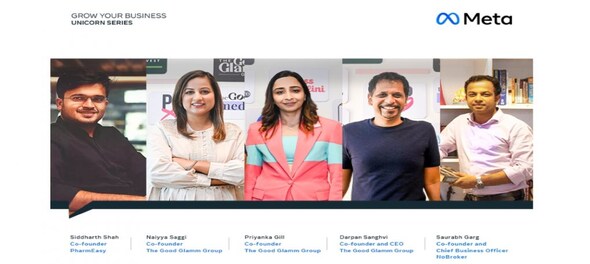
Unicorns of different stripes have found Meta as a trusted partner to be discovered by the right audience through increased personalisation and to expand at a rapid pace.
In the recent past, India has spawned a record number of privately-held startups, valued over $1bn. According to a report by PwC, a consultancy, over 50 outfits may enter the unicorn club this year alone. Some outfits like the Good Glamm Group, NoBroker, CoinSwitch and PharmEasy have made a mark for themselves in a short span by offering differentiated services and partnered with platforms like Meta to expand reach, corral its target market, woo content creators and provide developer tools to create user-friendly solutions. More crucially, Meta helps simplify a consumer’s path from “discovery to purchase”.
Take the Good Glamm Group, a content-to-commerce conglomerate and South Asia's first beauty unicorn. The outfit has utilised a wide assortment of products on Meta platforms like Facebook and Instagram to enhance reach through scalable and personalised ad campaigns.
Darpan Sanghvi, the conglomerate’s co-founder and group CEO describes his company as one that is built around “harnessing the power of content and creators to drive commerce”. Today, with over 88 million users, mostly women, across Facebook, Instagram and other Meta platforms, the startup clocks over 1.5 billion monthly impressions.
The Good Glamm Group’s personalised targeted campaigns on all its digital media platforms have “resulted in an unprecedented scale”, adds Sanghvi. Reels, stories, live interactions and other content formats on platforms like Instagram make it both easy and entertaining for both the content creators and consumers.
“Great businesses are built on great partnerships just like ours with platforms like Meta”, says Priyanka Gill, a co-founder. “This partnership has helped us power the content creator commerce flywheel at the Good Glamm Group”.
Such collaborations become all the more important in industries where educating the customer of the unique offering itself is a big challenge. Meta managed this with aplomb while educating users of a new-age financial product in lower-tier cities. Meta platforms including Facebook and Instagram helped CoinSwitch, India’s biggest crypto platform, to spread the word about the newfangled technology to millions of users across the country.
Whereas some companies disrupt the product itself, a few others have figured out a way to shake up traditional distribution channels. PharmEasy is one such startup in the healthcare industry which offers medicines and lab tests at affordable prices to consumers over a few clicks. The journey to become India’s first e-pharma unicorn was riddled with challenges: it had to ramp up its operations quickly before the market got cluttered.
Not only did PharmEasy have to serve every habitable pin code, but it also had to spread the word such that every diversified target group would discover its services. “We had to build a brand and get people to believe in us, and I think that is where Meta Technologies came into the picture”, says Siddharth Shah, the Chief Executive Officer of API Holdings, which owns the PharmEasy platform. “Platforms like Facebook played a crucial role in driving scale and performance at a razor-fast speed for us.”
Similarly, NoBroker, which reinvented the traditional and fragmented real estate market by eliminating middlemen, partnered with platforms like Meta, to scale across multiple categories. This enabled it to be discovered by the right target audience in a timely manner.
Today, the service saves a staggering Rs. 3,000 crores ($380m) annually in brokerage fees across six metropolitan cities. Saurabh Garg, a co-founder, credits an “extremely simple, seamless and intuitive user experience” of its platform. It was equally important to spread the word to have customers discover the new service. “Naturally, Meta was the first platform of choice”, says Mr. Garg.
Today, 18 million customers are connected on the NoBroker platform and 20% of the company’s paid registrations were driven by Meta. “We just started with a simple idea and a problem that we ourselves had faced. The magic happened when we got discovered by the right audiences through platforms like Facebook and Instagram.”
The common thread that binds the success of these unicorns is that they provide a differentiated product or a service by disrupting traditional models. They have all relied on platforms such as Meta to consolidate their positions. And Meta will continue in its pursuit to help such outfits to connect with its audience from diverse demographic backgrounds, build communities and grow their business.
This is a Partnered Post
First Published: Oct 28, 2022 11:27 AM IST
Check out our in-depth Market Coverage, Business News & get real-time Stock Market Updates on CNBC-TV18. Also, Watch our channels CNBC-TV18, CNBC Awaaz and CNBC Bajar Live on-the-go!



